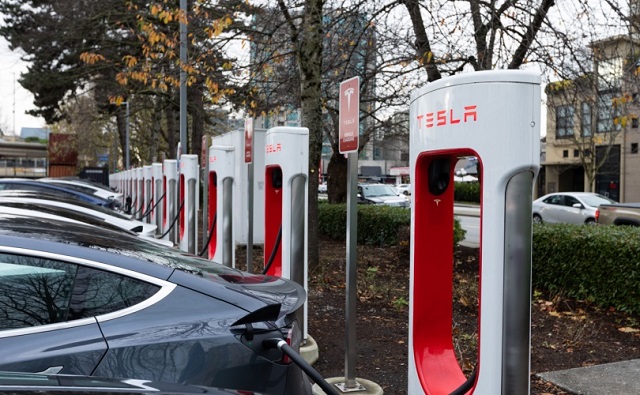Automotive
THOMPSON RELISHES TIGHT INDY PRO 2000 CHAMPIONSHIP BATTLE

From Parker Thompson Racing
In a season that has seen Parker Thompson take part in races belonging to four different championship series, a tight Indy Pro 2000 presented by Cooper Tires championship battle has been a source of renewed energy and motivation. Between Indy Pro 2000, GT3 Cup Challenge, and the Canadian Touring Car Championship, the young Alberta native has competed in twenty-seven races this year. Driving the #8 car of Abel Motorsports, Thompson currently holds second place in the overall Indy Pro 2000 Championship standings. He is coming off a double-duty weekend at the Honda Indy Toronto, where he combined for three podiums and four top-five finishes in Indy Pro 2000 and GT3 Cup events.
“In terms of action on the track, this season has certainly been busier than I could have ever imagined. Maybe at some point I’ll grow tired of racing almost every weekend, but that is pretty hard to imagine when we are caught up in championship battles like this one in Indy Pro 2000. The Road to Indy is where I started my racing career, and a championship here would mean so much to me. It’s a hard fight though. There are three of us [Kirkwood, Frost and Thompson] all within five points of each other for 2nd place in the standings. And I’m sure that each of us are looking up at Lindh in that first-place position more than we are looking at each other.”
The series travels to Mid-Ohio Sports Car Course this weekend for Championship Rounds 10 & 11. The 2.25-mile track is one familiar to Thompson. He earned a win there earlier this year in GT3 Cup. Given the tight nature of the Indy Pro 2000 championship race, a win again seems like the only sure way for Thompson to improve his position in the standings. With experience at multiple levels on the Road to Indy though, Thompson takes a slightly different stance.
“Of course winning is always the objective, but this is a long season that often rewards consistency. After winning the first two races in St. Petersburg, I’ve been reminded often how important that consistency is. With Abel Motorsports, we’ve made a lot of headway this year. One single performance isn’t going to earn us the title. If our group can continue in the direction that we’ve been headed over the last couple of weekends though, then I’m very excited about our chances.”
Event Schedule
Cooper Tires Indy Pro 2000 Grand Prix of Mid-Ohio – Rounds 10 & 11
16:15 – 16:35 EST Qualifying 1July 27, 2019
09:10 – 09:30 EST Qualifying 2
17:00 – 17:40 EST Race1
July 28, 2019
10:00 – 10:50 EST Race 2
Follow along live with RoadToIndyTV or on IndyPro2000.com
About Parker Thompson
Red Deer, Alberta native Parker Thompson is regarded as one of Canada’s premiere racing drivers. He started racing karts at age 8 and his natural talent and competitive drive quickly elevated him to international level competitions. By age 13 he was ranked 3rd in the world in Rotax Max karts. Now 21 years old, Parker continues his successful career racing on the Road to Indy, and in multiple sports car series.
Automotive
Trudeau’s electric vehicle mandate could cause Canada’s power grid to collapse, analysis shows

From LifeSiteNews
Not only would the need to generate more electric power skyrocket, but prices and taxes would soar for consumers, a Fraser Institute study found.
A noted fiscally conservative think tank warned that a proposed federal mandate from the government of Prime Minister Justin Trudeau to ban the sale of new gasoline/diesel-only powered cars after 2035 and allow electric-only sales is an unrealistic fantasy that would cause massive chaos by threatening to collapse the nation’s power grids.
“Requiring all new vehicle sales in Canada to be electric in just 11 years means the provinces need to substantially increase their power generation capabilities, and adding the equivalent of 10 new mega-dams or 13 new gas plants in such a short timeline isn’t realistic or feasible,” said G. Cornelis van Kooten, a Fraser Institute senior fellow and author of “Failure to Charge: A Critical Look at Canada’s EV Policy.”
“Canadians need to know just how much additional electricity is going to be required in order to meet Ottawa’s electric vehicle mandate, because its impact on the provinces — and taxpayers and rate payers — will be significant.”
Van Kooten’s in-depth analysis of the impending electric vehicle (EV) mandate was released March 14 and estimates that to meet the 2035 target national electric generation would need to go up some 15.3% in only 11 years, which is a monumental task.
This would mean building no less than 10 new mega hydro dams nationwide, or at least 13 new large natural gas plants, according to Van Kooten. For those pushing so-called “green” power, that would mean some 5,000 new wind turbines, which all must still be backed up by natural gas peaker plants because of their unreliability when the wind is not blowing.
Given the length of time it takes to build a natural gas plant due to red tape, costs, and other factors, van Kooten observed that “the major obstacle relates to the likelihood of constructing sufficient power generating capacity to meet the anticipated demand EVs would impose on electricity grids.”
“The real-world situation is not as easy as merely replacing current ICE vehicles with EVs, and there are many obstacles to be overcome on the path of electrifying the personal vehicle fleets within Canada,” he said.
“The type of electricity that goes into the grid would also be a big consideration when switching over to EVs, as jurisdictions will need to increase their electricity production capabilities with green sources that meet the additional hourly load requirements and can be employed quickly to balance intermittent renewable energy sources.”
Van Kooten’s study looks at how much extra electricity will be required in all of Canada’s biggest provinces, Ontario, British Columbia, and Quebec to meet the 2035 EV mandate.
The Fraser Institute, for context, observed that “It took approximately 10 years to plan and pass environmental regulations, and an additional decade” to build British Columbia’s new hydroelectric Site C dam.
Trudeau plans to ban the sale of new gasoline-powered cars after 2035. The EU (European Union) also has an EV mandate in place for the same year.
Canadian Environment Minister Steven Guilbeault announced just before Christmas the “Electric Vehicle Availability Standard.” This is a plan that will mandate that all new cars and trucks by 2035 be electric, which would in effect ban the sale of new gasoline- or diesel-only powered vehicles after that year.
The reality is that electric cars cost thousands more to make and buy, are not suited to Canada’s cold climate, offer poor range and long charging times (especially in cold weather), and have batteries that take tremendous resources to make and are hard to recycle.
Just over a week ago, LifeSiteNews reported that a 2022 study found that electric vehicles pollute at a rate far higher than their gasoline or diesel-powered counterparts.
Not all Canadian provinces are on board Trudeau’s EV dictate
In January, LifeSiteNews reported that Alberta’s Minister of Energy criticized the federally funded Canadian Broadcasting Corporation (CBC) for publishing a report stating that electric cars are better able to handle cold weather than gas-powered ones, all at the same time an extreme cold snap gripped much of western Canada and nearly caused Alberta’s power grid to collapse due to its increased reliance on so-called renewable energy.
Alberta Premier Danielle Smith has promised that she intends to fight with “everything” at her disposal what she called an “unconstitutional” new federal government EV mandate as well as a net-zero power generation, which if implemented would lead to guaranteed power outages.
She noted that when it comes to Trudeau’s EV mandate, “Ottawa is trying to force increased demands on the electricity grid while simultaneously weakening Alberta’s and other provinces’ grids through their federal electricity regulations.”
Trudeau’s EV mandates have also been called out by the automotive industry in Canada. The Canadian Vehicle Manufacturers’ Association said in response to the new EV mandate that forcing people to buy EVs will “disproportionately impact households living in rural and northern communities that may have lower access to public charging infrastructure.”
Automotive
High-tech cars are secretly spying on drivers, resulting in insurance rejections: NYT report

From LifeSiteNews
Many Americans’ driving habits are monitored without their knowledge or consent, and their driving data is being used to make decisions about insurance coverage and rates.
A lawsuit accuses General Motors of spying on a Florida man’s driving habits via his 2021 Cadillac XT6, resulting in his rejection by seven auto insurance companies.
The man, Romeo Chicco, is also suing LexisNexis, the company that shared his data with the insurance companies.
The New York Times reported:
Modern cars have been called “smartphones with wheels,” because they are connected to the internet and packed with sensors and cameras. According to the complaint, an agent at Liberty Mutual told Mr. Chicco that he had been rejected because of information in his “LexisNexis report.” LexisNexis Risk Solutions, a data broker, has traditionally kept tabs for insurers on drivers’ moving violations, prior insurance coverage and accidents.
When Mr. Chicco requested his LexisNexis file, it contained details about 258 trips he had taken in his Cadillac over the past six months. His file included the distance he had driven, when the trips started and ended, and an accounting of any speeding and hard braking or accelerating. The data had been provided by General Motors — the manufacturer of his Cadillac.
Chicco had downloaded the MyCadillac app, and “was eventually told that his data had been sent via OnStar — G.M.’s connected services company, which is also named in the suit — and that he had enrolled in OnStar’s Smart Driver program, a feature for getting driver feedback and digital badges for good driving.”
Another New York Times report explored the extent to which car manufacturers and insurance companies are able to access data about drivers: a man whose insurance rates increased by 21 percent learned that LexisNexis had “more than 130 pages detailing each time he or his wife had driven the [Chevrolet] Bolt over the previous six months. It included the dates of 640 trips, their start and end times, the distance driven and an accounting of any speeding, hard braking or sharp accelerations. The only thing it didn’t have is where they had driven the car.
As cars become increasingly high-tech, freedom and civil liberties advocates like Republican U.S. Rep. Thomas Massie of Kentucky have warned that such features may become weaponized. For example, a 2021 federal law mandates that by 2026 new cars have a “kill switch” by which they be disabled from afar – supposedly an anti-drunk driving measure. As LifeSiteNews has reported, manufacturers must put a system in cars that can “passively monitor the performance of a driver of a motor vehicle to accurately identity whether that driver may be impaired” and can stop or limit “motor vehicle operation” if “impairment is detected.”
-

 Housing2 days ago
Housing2 days agoTrudeau admits immigration too much for Canada to ‘absorb’ but keeps target at record high
-

 Censorship Industrial Complex2 days ago
Censorship Industrial Complex2 days agoTrudeau’s new online censorship law – Problems with Bill C-63 / the Online Arms Law
-

 conflict2 days ago
conflict2 days agoWestern leadership’s detachment from reality is causing terror and death across the globe
-

 Business2 days ago
Business2 days agoDecarbonization deal opens new chapter in Alberta-Japan relationship
-

 Censorship Industrial Complex2 days ago
Censorship Industrial Complex2 days agoNPR senior editor admits extreme bias in Russia collusion, Hunter Biden laptop, COVID coverage
-

 2024 City Councilor By-Election2 days ago
2024 City Councilor By-Election2 days agoGet to know your candidates for city council: Calvin Yzerman
-

 National2 days ago
National2 days agoTrudeau drops nearly $200K on airplane food during six-day trip
-

 2024 City Councilor By-Election2 days ago
2024 City Councilor By-Election2 days agoGet to know your candidates for city council: Liam (The Level) Milaney







